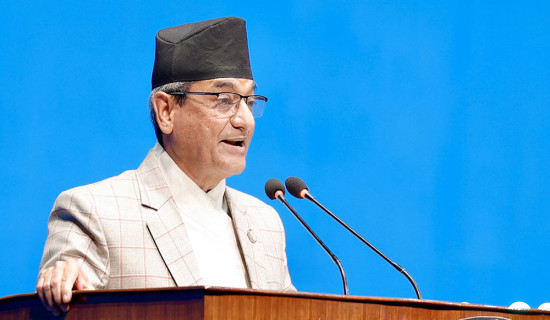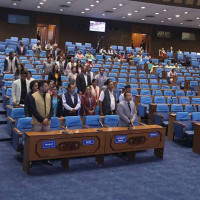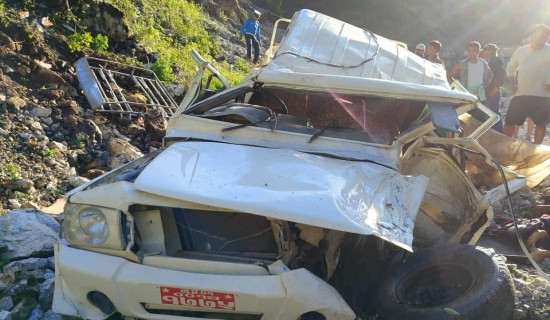- Saturday, 14 June 2025
World Environment Day marked across country
By A Staff Reporter,Kathmandu, June 6: The World Environment Day was marked on Wednesday across the country with the theme, “Our land. Our future. We are #GenerationRestoration.”
In a message issued on the occasion of World Environment Day, Prime Minister Pushpa Kamal Dahal ‘Prachanda’ said, “This day, focused on restoring land from desertification and drought and reinstating ecological systems, aims to further motivate efforts to mitigate the impacts of climate change and ensure a sustainable and clean environment for present and future generations.”
Prime Minister Prachanda said, “Despite our negligible role in the negative impacts and damages caused by global climate change, Nepal is significantly affected. The government is active in ensuring Nepal's rights to climate-related damages by implementing the issues and commitments raised in various international forums.”
Stating that the Constitution of Nepal guarantees every citizen the fundamental right to live in a clean and healthy environment, he said that the government had implemented policies and programmes to scientifically manage and utilise land based on its productivity, nature, and environmental balance, adhering to the principles of sustainable environmental development to maintain environmental balance and sustainability.
Prime Minister Prachanda also expressed his gratitude to all agencies and stakeholders contributing to environmental conservation and management.
Similarly, speaking at a programme organised by the Department of Environment to mark Environment Day, Minister of Forests and Environment Nawal Kishore Sudi Sah said that everyone must come together to address the problems caused by climate change and to ensure a clean environment for future generations.
Minister Sudi also said that the impact of climate change is causing global temperatures to rise, which could lead to increased drought and decreased agricultural production.
Highlighting the issue of long-lasting plastic pollution, he stressed the need for collective efforts to control the use of plastic products.
Director General of the Department of Environment, Bhupal Baral, stressed the need for coordination among other government bodies, the three levels of government, and related agencies to implement environmental standards.
“Land pollution, water pollution, air and noise pollution, and temperature rise caused by climate change are the main environmental challenges,” he said.
Speaking at the programme, the Deputy Director General of the Department, Shailesh Kumar Jha, suggested that increasing dryness could lead to a decline in agricultural production in the long run, highlighting the need for everyone's increased interest in environmental improvement.
According to him, “Dryness can lead to increased degradation and damage to the ecological system, reducing agricultural production. It is necessary to adopt awareness in time.”
Pradeep Kumar Koirala, Acting Secretary of the Ministry of Forests and Environment, informed that the government was focusing on environment-friendly development programmes.
Similarly, Sath Sathai, an NGO working for climate change, organised a rally in Kathmandu for environmental justice to mark the day.
The rally, supported by 64 organisations, began from Bhadrakali and concluded at Basantapur.
Deputy Speaker Indira Rana Magar, who was among the rally participants, expressed her concern over the increasing problem of snow melting caused by climate change.
“Nepal's majestic mountains are losing their snow cover,” she said, highlighting the need for collective actions to address the pressing issue.
Former Chief Justice Kalyan Shrestha said Nepal's mountains are losing snow cover due to the effect of climate change. He advised Nepal to amplify its voice to demand compensation from those countries responsible for carbon emissions.
Sath Sathai's Chairperson Prajita Karki said the collective efforts are warranted to keep the environment safe.
Meanwhile, Building a Resilient Churia Region in Nepal (BRCRN) has planted saplings in Lalgarh of Dhanusha to mark the environment day.
A hundred saplings of Indigenous species such as sacred fig (peepal), banyan (bar), gooseberry, jackfruit, mango, neem, chinaberry, etc
have been planted on the fallow land on the banks of Badahari river in Lalgadh–9.

















